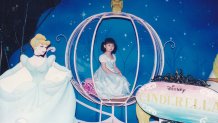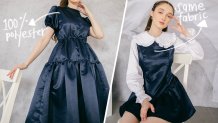Nadia Tandra had a vision for what working in fashion would be like.
Growing up in Indonesia, with her mother who designed clothes and her grandmother who ran a garment factory, Nadia could not wait to become a designer.

"I imagined this fashion world would be like a magical place," Nadia said. "But when I grew up, I realized it's not true."
She became disappointed by fast fashion, a term that refers to companies over-producing clothes to meet fast-moving trends.
The number of garments produced annually exceeded 100 billion for the first time in 2014, according to a study by McKinsey.
And the clothes consumers are buying aren't staying in their closets. The U.S. Environmental Protection Agency (EPA) reported that landfills received 11.3 million tons of textiles in 2018.
"I was hoping to change that, give people a better option for shopping online, do my best to be sustainable and ethical throughout my business and my brand," Nadia said.
The young designer said she was disillusioned by headlines of garment workers working long hours and being underpaid. With her grandmother's work leading by example, Nadia created a brand with a small manufacturing team "that is incredibly passionate about their work."
From her home in Maryland, Nadia launched Lunellery in 2020 with the help of family and friends in Indonesia who she trusts in the fashion industry. Her clothing brand focuses on small production of dresses made of selective, dead stock fabrics.
Launching a Brand
Lunellery dresses are not what consumers usually think of when it comes to sustainable fashion.
With fairy tales in mind, Nadia created the brand amid the coronavirus pandemic as a way to "escape to a magical world," she said.
"I've always loved pink and pastel colors, and I think there's a need in the market for, like, affordable, sustainable princess dresses," Nadia said.
Nadia designed the dresses with the idea of consumers dressing up for multiple occasions, including picnics — which have become popular during the pandemic.
"We focus on low waste, creating small quantities and testing the success of each style and seeing, like, what sticks with the customers," Nadia said.
Photos: Maryland Designer Creates Princess-Style Dresses Focused on Sustainability
She makes about ten to 15 pieces per style.
"I think we just want to make sure we don't have that excess waste because we just don't want to pay tribute to pollution and clogging the landfills," Nadia said.
Janice Wallace is a D.C. sustainability expert who helps consumers build a more sustainable closet. She said mass production and overproduction of clothes are two of the biggest contributors to the lack of sustainability in the fashion industry.
She used companies, such as H&M, as an example.
"What are they doing with that excess? A lot of the times things are being burned," Wallace said.
The EPA reported that 3.2 million tons of textiles were combusted in 2018.
Nadia said she hopes that her brand can encourage consumers to think more about the production of their clothes.
Selecting the Right Fabric
The same fabric is used for different dress designs at Lunellery. Nadia buys dead stock fabrics — textiles that a store has left over or already readily available.
"I focus on fabrics that can be recycled," Nadia said.
For Lunellery's first launch, all the dresses were 100% cotton and 100% polyester. Designers say pure fabrics are easier to recycle and made into new garments rather than fabrics with mixed components — for example, 60% cotton and 40% polyester.

"They're just going to go straight into the landfills," Nadia said. "They don't know what to do with these mixed components,"
Wallace says it is sometimes hard for smaller brands to jump on board with sustainable fabrics. She said the problem is prices.
"If the larger brands start using organic cotton and replace the regular cotton, eventually the price of organic cotton will come down and make it easier for the smaller brands to be able to use organic cotton," Wallace said.
As an owner of a small business with a limited budget, Nadia said keeping her inventory small has helped focus on quality and creating timeless pieces that can be worn for a long time.
"We don't want to be stuck on trends," she said.

